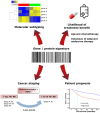An Update on Breast Cancer Multigene Prognostic Tests-Emergent Clinical Biomarkers
- PMID: 30234119
- PMCID: PMC6131478
- DOI: 10.3389/fmed.2018.00248
An Update on Breast Cancer Multigene Prognostic Tests-Emergent Clinical Biomarkers
Abstract
Multigene signatures generate crucial prognostic information particularly useful for cancer patients where clinical parameters and traditional immunohistochemical markers alone lead to equivocal prognosis. Clinicians are now provided with molecular tools that assist in the outline of adjuvant therapies, namely helping decide on the extension of adjuvant endocrine therapy or on suppressing adjuvant chemotherapy in patients were toxic effects are particularly deleterious or when this treatment is fundamentally not needed. The importance of cancer multigene prognostic signatures is well elucidated in the guidelines for adjuvant systemic therapy in early-stage breast cancer and the guidelines on disease staging that are progressively integrating gene expression assays as classification biomarkers. In addition to the predictive and prognostic value, some genetic tests provide intrinsic subtyping classification. Herewith, we compare the molecular tests OncotypeDX, MammaPrint, Prosigna, EndoPredict, Breast Cancer Index, Mammostrat, and IHC4 and report the eligibility of each one in the suitable setting. Through to now, there is not a commercially available multigene test that makes recommendations regarding adjuvant treatment for HER-2 and triple negative breast cancers. Thus, these patients still receive adjuvant chemotherapy. Importantly, triple negative carcinomas are very heterogeneous regarding prognosis and new molecular signatures that decipher this very heterogeneous subgroup of breast cancer may improve the clinical management of the disease.
Keywords: biomarkers; breast cancer; genetic assays; molecular signatures; prognostic tests.
Figures
Similar articles
-
Gene expression profiling and expanded immunohistochemistry tests to guide the use of adjuvant chemotherapy in breast cancer management: a systematic review and cost-effectiveness analysis.Health Technol Assess. 2013 Oct;17(44):1-302. doi: 10.3310/hta17440. Health Technol Assess. 2013. PMID: 24088296 Free PMC article. Review.
-
Genomic Signatures in Luminal Breast Cancer.Breast Care (Basel). 2020 Aug;15(4):355-365. doi: 10.1159/000509846. Epub 2020 Jul 21. Breast Care (Basel). 2020. PMID: 32982645 Free PMC article. Review.
-
Multigene prognostic tests in breast cancer: past, present, future.Breast Cancer Res. 2015 Jan 27;17(1):11. doi: 10.1186/s13058-015-0514-2. Breast Cancer Res. 2015. PMID: 25848861 Free PMC article. Review.
-
Multigene Assays for Classification, Prognosis, and Prediction in Breast Cancer: a Critical Review on the Background and Clinical Utility.Geburtshilfe Frauenheilkd. 2013 Sep;73(9):932-940. doi: 10.1055/s-0033-1350831. Geburtshilfe Frauenheilkd. 2013. PMID: 24771945 Free PMC article.
-
Prospective, multicenter French study evaluating the clinical impact of the Breast Cancer Intrinsic Subtype-Prosigna® Test in the management of early-stage breast cancers.PLoS One. 2017 Oct 18;12(10):e0185753. doi: 10.1371/journal.pone.0185753. eCollection 2017. PLoS One. 2017. PMID: 29045452 Free PMC article.
Cited by
-
Predictive models and biomarkers for survival in stage III breast cancer: a review of clinical applications and future directions.Ann Med Surg (Lond). 2024 Aug 30;86(10):5980-5987. doi: 10.1097/MS9.0000000000002517. eCollection 2024 Oct. Ann Med Surg (Lond). 2024. PMID: 39359789 Free PMC article. Review.
-
The Potential Use of Tumour-Based Prognostic and Predictive Tools in Older Women with Primary Breast Cancer: A Narrative Review.Oncol Ther. 2020 Dec;8(2):231-250. doi: 10.1007/s40487-020-00123-3. Epub 2020 Jul 17. Oncol Ther. 2020. PMID: 32700048 Free PMC article. Review.
-
Breast cancer molecular subtypes and receptor status among women at Potchefstroom Hospital: a cross-sectional study.Pan Afr Med J. 2021 Jan 26;38:85. doi: 10.11604/pamj.2021.38.85.23039. eCollection 2021. Pan Afr Med J. 2021. PMID: 33889251 Free PMC article.
-
Identification of miRNA-Based Signature as a Novel Potential Prognostic Biomarker in Patients with Breast Cancer.Dis Markers. 2019 Dec 30;2019:3815952. doi: 10.1155/2019/3815952. eCollection 2019. Dis Markers. 2019. PMID: 31976020 Free PMC article.
-
hist2RNA: An Efficient Deep Learning Architecture to Predict Gene Expression from Breast Cancer Histopathology Images.Cancers (Basel). 2023 Apr 30;15(9):2569. doi: 10.3390/cancers15092569. Cancers (Basel). 2023. PMID: 37174035 Free PMC article.
References
Publication types
LinkOut - more resources
Full Text Sources
Other Literature Sources
Research Materials
Miscellaneous


